
|

|
 |
|
|
An up close and personal interview with U.S. Police Veteran and Togetherweserved.com Member:
DET George F Reilly (1966-1987)
New York Police Department
WHAT INFLUENCED YOUR DECISION TO MAKE A CAREER IN LAW ENFORCEMENT?
 It was something I always wanted to do since I came from a police family and always admired police officers. I also wanted to be a Marine so on my 18th birthday I enlisted in the Marine Corps. When my four-year enlistment was up I got out and bounced around at various jobs, but wasn't happy in any of them. That's when I decided it was time to become the NYC police officer I always wanted to be. But there was one problem. It was something I always wanted to do since I came from a police family and always admired police officers. I also wanted to be a Marine so on my 18th birthday I enlisted in the Marine Corps. When my four-year enlistment was up I got out and bounced around at various jobs, but wasn't happy in any of them. That's when I decided it was time to become the NYC police officer I always wanted to be. But there was one problem.
The height requirement for the NYPD was 5'8" at that time. I wasn't quite that tall. Eventually, I went to a chiropractor to get stretched. I needed about 1/4 in more. After a lot of stretching, I finally made it and was appointed to the NYC Transit Police (NYCTPD) on November 4, 1966. Following my graduation from the Academy, I was assigned to District Number One in Mid-Town Manhattan. I remained there until October 24, 1968. I still had not given up on being a city cop, however.
I had taken the test for the NYPD while a member of the NYCTPD. By now the height was lowered to 5'7 ½ inches. I was accepted and sent back to the Academy. My first assignment after the Academy was a Patrolman in the South-Bronx 42nd Precinct. Man, was that wild. It was the happiest time of my life. This is what cops did for a living.
WHAT HAS BEEN YOUR CAREER PATH AND WHAT ARE YOU DOING NOW?
While at the South-Bronx 42nd Precinct, I was selected for the NY Joint Narcotics Task Force. I reported for duty on August 20,1971. I worked with agents from Bureau of Narcotics and Dangerous Drugs/Drug Enforcement Administration (BNDD/DEA) as well as New York State Troopers. A Dangerous Drug (a  catch-all) is any Non-Narcotic Drug deemed by the Attorney General of the United States to have a high potential for abuse. I remained there for about six years before being assigned to a new unit in Central Harlem: The Street Enforcement Unit/Narcotics Division. catch-all) is any Non-Narcotic Drug deemed by the Attorney General of the United States to have a high potential for abuse. I remained there for about six years before being assigned to a new unit in Central Harlem: The Street Enforcement Unit/Narcotics Division.
In April of 1980 I was assigned to the 14th Homicide Zone in Brooklyn-North (affectionately known as the home of Disorganized Crime). Most of the detectives were 'old-timers' and many had served in The Black Liberation Squad during the 1970's. They were great, no nonsense men and one woman, Mary McCarthy, a former nun. Eventually, the Homicide Zones were disbanded due for the financial straits of NYC.
I was then assigned to the 90th Precinct Detective Squad with several temporary assignments to Manhattan-North Homicide, Mid-Town Rapist Task Force, and others. I rubbed shoulders with the greatest detectives in the world.
By now I'm a Detective. I was assigned to SEU/ND for about 3 years. I then went to the 14th Homicide Zone in Brooklyn-North (remember 'the home of Disorganized Crime'). The Homicide Zones were eventually eliminated and homicides were assigned at the Precinct Detective Squad of occurrence. I was assigned to the 90th Precinct Detective Squad in Brooklyn-North.
On Sept. 21, 1983, I was "temporarily assigned" to the Yeshiva University Homicide Task Force in Manhattan (Washington Heights) followed by another "temporary assignment" to Manhattan-North Homicide. The next "temporary assignment" was to the Midtown Rapist Task Force. So, a two-week temporary assignment lasted two years. Sound familiar?
In August 1985 I was sent back 90th Precinct Detective Squad in Brooklyn-North. I remained there until I retired on July 3, 1987. The two years with the Transit Police counted as NYPD time.
I then went to work as Security Manager for Bristol-Myers Squibb Company. A few years ago I retired completely. But I wanted to find something else to do. My wife, Donna, informed me, "I married you for better or worse, but not for lunch." So I went out and found something else I loved.
The Newburgh Ministry (Newburgh, N.Y., the Most Violent small city in the U.S.) was founded 30 years ago by two Catholic nuns. It went from a storefront to a 19 bed shelter for homeless men and women. 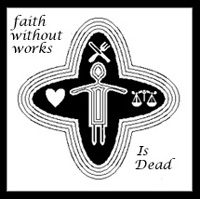 During the day, it is open to accommodate all-comers. There is a Hospitality Area where one can drink coffee, take a nap, play dominoes, and have a few laughs without worrying about getting mugged or murdered. There is a nursery for the neighborhood kids. There is a thrift shop where one can buy clothes for a nickel or a dime. Purchasing the clothes gives a person a sense of ownership rather than feeling like a charity case. That said, if you don't have the nickel or dime, you can have it for free. We have a hygiene closet with soap, shampoo, toothpaste, and most of all toilet paper. I am a full time staff member who gets no salary. During the day, it is open to accommodate all-comers. There is a Hospitality Area where one can drink coffee, take a nap, play dominoes, and have a few laughs without worrying about getting mugged or murdered. There is a nursery for the neighborhood kids. There is a thrift shop where one can buy clothes for a nickel or a dime. Purchasing the clothes gives a person a sense of ownership rather than feeling like a charity case. That said, if you don't have the nickel or dime, you can have it for free. We have a hygiene closet with soap, shampoo, toothpaste, and most of all toilet paper. I am a full time staff member who gets no salary.
This is me supervising the unloading of a truck load of contributions from a church group. Many of the churches (all denominations) have food and money drives to support the Ministry. Without people's generosity, we're out of business. No government funding for the Ministry.
DID YOU SERVE IN THE MILITARY PRIOR? AND IF SO, IN WHAT BRANCH OF SERVICE? IN WHAT WAYS HAS MILITARY SERVICE INFLUENCED YOUR CAREER IN LAW ENFORCEMENT?
I served in the US Marine Corps from Feb. 25, 1960 until Feb. 24, 1964. I was fortunate to serve in "Operation Shufly" in Danang, Republic of Vietnam from January to November of 1963.
"Operation Shufly" was a most interesting experience at a time when few Americans had ever heard of Vietnam and fewer still knew American military forces were involved. We were the first operational Marine Corps unit deployed to Vietnam with the mission of conducting combat operations and delivering troops and supplies throughout the operating area flying UH-34D helicopter.
 Before my tour of duty in Vietnam was over, I had flown over 600 hours as a crewman over dense jungle areas deep in Viet Cong territory. Often I flew as a door gunner. Before my tour of duty in Vietnam was over, I had flown over 600 hours as a crewman over dense jungle areas deep in Viet Cong territory. Often I flew as a door gunner.
In October 1963 two helicopters from HMM-361 crashed while searching for American and Vietnamese military aboard a plane shot down during a bombing run. Nine Marines and three sailors were killed aboard the two helicopters.
My military experience showed me how to make a decision very quickly and take charge of a situation. I was a Team Leader in the Narcotics Division and in the Detective Squad. That's because I am a Marine. And it runs in the family. My son was a Marine and his son is now a Marine. This photo shows a proud dad and granddad with my grandson who just graduated from Boot Camp at Parris Island.
WHICH, OF THE AGENCIES OR DEPARTMENTS YOU WERE ASSIGNED TO, DO YOU HAVE THE FONDEST MEMORIES OF AND WHY?
My fondest memory is working in the Street Enforcement Unit/Narcotics Division. We worked Central Harlem. The old folks loved to see us hit the streets. We received a Unit Citation in 1978 for taking an incredible amount of guns off the street. Our Commanding Officer would yell at us, "Get out there and apprehend willfully and wantingly." Nobody challenged us.
Another fond memory was when my partner and I stopped a Cadillac driven by two mobsters and found a bag  with nearly one millions dollars we learned later was to pay off a dirty cop who had stolen drugs from the evidence room. with nearly one millions dollars we learned later was to pay off a dirty cop who had stolen drugs from the evidence room.
We took them to the precinct and when questioned, we found out they worked for Carmine Tramunti, a New York mobster who was the boss of the Lucchese crime family. Tramunti was well known as having helped build the massive French Connection heroin smuggling ring. This was a scheme through which heroin was smuggled from Turkey to France and then to the United States. The operation reached its peak in the late 1960's and early 1970's, and was responsible for providing the vast majority of the illicit heroin used in the United States.
On October 4, 1973 Tramunti and 43 other mobsters were indicted on narcotics trafficking charges. Ultimately Tramunti was convicted for financing the huge heroin smuggling operation. Tramunti's conviction in the French Connection case is referenced in the 1990 movie "Goodfellas."
FROM YOUR ENTIRE LAW ENFORCEMENT CAREER WHAT PARTICULAR INCIDENT HAD THE BIGGEST IMPACT ON YOU AND WHY?
Early one afternoon we sent undercover cops Adrian Wallace and Jimmy Wood into an abandoned building on W 141 Street between 7th Ave & Lenox Ave. It was a "Rip Off" and the U/Cs told us that all the Perps were armed. I entered the building. It was black as night. Shots were being fired above me. Chris Turner had gone to the roof. I could hear a Perp running down the broken stairs. We confronted each other and fired. We both missed. He jumped out the window and was eventually caught.
How vulnerable we all are. Later that year, my sergeant was shot between the eyes while executing a Search Warrant on W 138th Street. Believe it or not, he lived. The Perp was Benjamin Riley.
OF THE MEDALS, AWARDS OR BADGES YOU RECEIVED, WHAT IS THE MOST MEANINGFUL TO YOU AND WHY?
 The Exceptional Merit Award for the shooting above. I also received numerous awards and citations including two FBI Commendations for Bank Robbery Arrests. The Exceptional Merit Award for the shooting above. I also received numerous awards and citations including two FBI Commendations for Bank Robbery Arrests.
After retiring, I apprehended a bank robber and was honored twice at the New York City's Waldorf-Astoria Hotel. I didn't attend either event in that my granddaughter, Megan, was born at Cherry Point. She was more important than the awards. I had my friend Frank Cardaio accept the awards for me. Everybody thought I was really a tall Italian stud instead of a short Irish guy.
WHICH INDIVIDUAL PERSON FROM YOUR CAREER MADE THE MOST POSITIVE INFLUENCE ON YOU AND WHY?
Captain James Power, the Commanding Officer of The Street Enforcement Unit. He truly loved his troops.
CAN YOU RECOUNT A PARTICULAR INCIDENT FROM YOUR CAREER THAT WAS FUNNY AT THE TIME AND STILL MAKES YOU LAUGH?
We hit a Search Warrant in East Harlem. There was a true attack dog inside the apartment. He never barked. When the door finally flew open the occupant let his dog loose to attach us. I shot the dog first. He didn't go down. 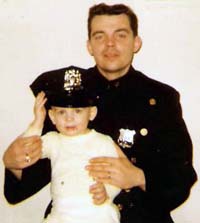 Paddy Barry finally got him with the shotgun. I felt terrible about it. My daughter, Lisa, wouldn't talk to me for days for killing the dog. Anyway, we had to be interviewed by the Duty Captain: Capt Peter Lamb, a notorious pain in the butt. Paddy Barry finally got him with the shotgun. I felt terrible about it. My daughter, Lisa, wouldn't talk to me for days for killing the dog. Anyway, we had to be interviewed by the Duty Captain: Capt Peter Lamb, a notorious pain in the butt.
Paddy and I had a few belts to 'calm us down.' When Lamb finally arrived, he interviewed me first. I was a Detective and Paddy was a patrol officer. He asked me why I shot the dog. I said (slurred), "Sir, he barked something in Spanish and had a knife in his teeth." He was not amused.
The story was all over the NYPD. I was a hero (for a short while, anyway). I survived it though. How? I don't know.
WHAT DO YOU CONSIDER THE MOST IMPORTANT LESSON YOU HAVE LEARNED AS A LAW ENFORCEMENT OFFICER?
Never take anything or anyone for granted. Always have an open mind. Never overlook the obvious. Always go with your gut. Pay attention to detail.
WHAT LAW ENFORCEMENT ASSOCIATIONS ARE YOU A MEMBER OF, IF ANY? WHAT SPECIFIC BENEFITS DO YOU DERIVE FROM YOUR MEMBERSHIP(S)?
Detectives Endowment Association, the Honor Legion of the NYPD and the NYPD 10-13 Association. I belong there.
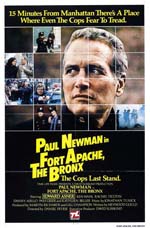 Like the military, police organizations are brotherhoods. I remember my 1st day in the South-Bronx after the Academy. An old clerical patrolman held a 'welcome aboard' meeting with the rookies. He said, "You are not cops. You are an army of occupation. The only people in this neighborhood who want you here live in this building. Everybody else hates you and will try to hurt you." He was right. Within a week or so, a couple of the rookies resigned. That's what I mean by brotherhood (See 'Fort Apache, The Bronx). Like the military, police organizations are brotherhoods. I remember my 1st day in the South-Bronx after the Academy. An old clerical patrolman held a 'welcome aboard' meeting with the rookies. He said, "You are not cops. You are an army of occupation. The only people in this neighborhood who want you here live in this building. Everybody else hates you and will try to hurt you." He was right. Within a week or so, a couple of the rookies resigned. That's what I mean by brotherhood (See 'Fort Apache, The Bronx).
HOW HAS SERVING AS A LAW ENFORCEMENT OFFICER INFLUENCED THE WAY YOU CONDUCT YOUR PERSONAL LIFE AND YOUR RELATIONSHIPS WITH OTHERS OUTSIDE OF THE DEPARTMENT?
I will always gravitate to other cops. I trust them. I depend on them. I love them.
WHAT ADVICE WOULD YOU HAVE FOR A ROOKIE WHO HAS JUST PUT ON THE BADGE?
Always yield to experience. We stay connected. We understand each other. We belong!
IN WHAT WAYS DO YOU FEEL THIS WEBSITE CAN BENEFIT THE LAW ENFORCEMENT COMMUNITY?
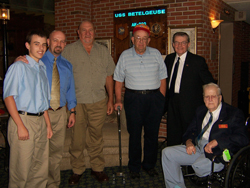 I have spent a good portion of my life hunting men while a detective with the NYPD and working with various private investigator agencies. Since joining TWS and becoming a member of the Person Locator Team, I now hunt for men and women in an effort to reunite them with 'lost' military buddies. I get more joy out of a successful 'hunt' than the person requesting my help. I have spent a good portion of my life hunting men while a detective with the NYPD and working with various private investigator agencies. Since joining TWS and becoming a member of the Person Locator Team, I now hunt for men and women in an effort to reunite them with 'lost' military buddies. I get more joy out of a successful 'hunt' than the person requesting my help.
Between TWS and my duties at the Ministry, I often wonder where I found time to work a real job. I never thought I'd be a happy retiree.
|
|
|
Share this Voices on:


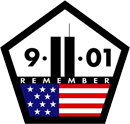

|
|
TWS VOICES
TWS Voices are the personal stories of men and women who currently serve, or who previously served as a US Police or Federal Officer, and conveys how serving their Country and Community has made a positive impact on their lives. If you would like your story to be featured in a future edition of Voices, or know someone else who may be interested, please contact TWS Voices HERE.
This edition of Police Voices was supported by:
Police.Togetherweserved.com
For all current serving and veteran Police Officers, Together We Served is a secure, feature rich website enabling Officers to reconnect with lost Brothers and Sisters, share in the camaraderie of other Officers, network for professional purposes and to honor the service of all.
To join Police.Togetherweserved.com, please click HERE.
| |